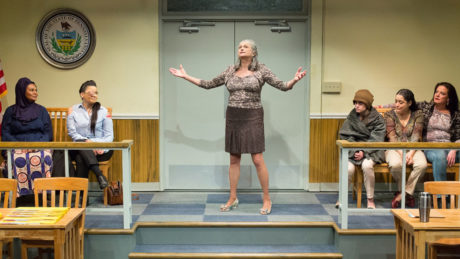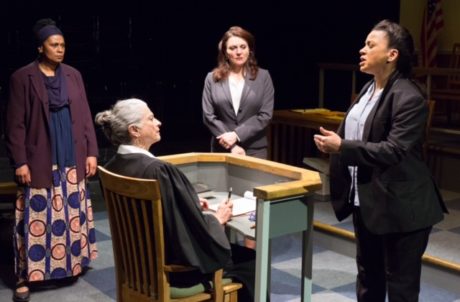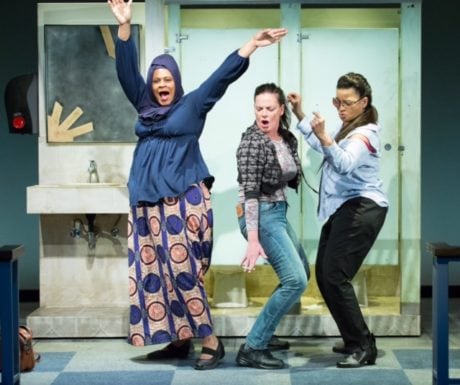Gritty and harsh, but with flashes of humor and hope, Project Dawn tackles a vital issue and doesn’t shy away from showing its worst repercussions. Karen Hartman’s play, inspired by a real-life court with a novel solution for eliminating the scourge of prostitution, provides lots of food for thought – and lots of rich, meaty roles for its all-female cast.

Project Dawn was inspired by Dawn’s Court, a Philadelphia-based court based on the idea that the way to end prostitution is not simply to lock up women for sex trafficking but to give them a way out of the dismal conditions that have led them there. The women are given goals and incentives that, if followed closely, allow them to avoid jail time altogether. Project Dawn takes place over a four-month period in which women are brought into court regularly for evaluations. Every case is difficult, and every case is different: some of the women make steady progress, some graduate from the program and move on, others fail and have to serve jail time.
The judge and the attorneys work diligently and sensitively to help the women, but sometimes they just can’t do enough. And sometimes they worry that they’re working too hard: after it’s learned that a diabetic woman has not been following her prescribed diet and is in risk of losing a foot, the judge and attorneys debate whether they should punish her, or if that would be too harsh. “This is court, not Weight Watchers,” says the judge. The Public Defender agrees: “If we police diet,” she says, “no one will graduate this program.”
Project Dawn is sympathetic to the plight of women caught in the sex trade, and critical of the exploitative economy that keeps them down. The stories the women tell – of how they ended up in the trade and how they struggle to rise above it – are harrowing at times, and they have the ring of truth, reflecting the extensive research Hartman undertook in creating the play. And Hartman shows how the women who work in the court are affected too, from the young, naïve apprentice filled with optimism (“I want to be part of the solution,” she says) to the middle-aged Public Defender who’s burning out fast and hard.
But the steep volume of sad stories is overwhelming, creating a gloomy mood that occasional lighter moments can’t overcome. While it has good intentions, too much of Project Dawn comes across more as a litany of social crises than a drama. And the play frequently stops for minutes at a time so that witnesses can give lengthy testimony, robbing the play of its momentum. By the second act of this lengthy play, these repetitive, digressive scenes bog down the proceedings so much that one wishes that we had at least one less troubled character to follow. (The opening scene of Act Two, in which the court officers fill out a questionnaire with touchy-feely questions like “What is your personal definition of power?”, is too introspective for its own good and stops the play dead in its tracks.)

Fortunately, there’s a first-rate cast that can handle Hartman’s rapid dialogue and can slip in and out of multiple roles – often within the same scene, and with startling precision. For instance, Claire Inie-Richards appears as Ashlee, a glowering, morose, uncommunicative prostitute in a wool cap and an oversized army jacket; but in an instant Inie-Richards pulls off the cap and jacket and transforms into Noelle, a preppy legal intern determined to make the world a better place.
Transformations like this take place throughout Project Dawn. Yvette Ganier, as the blunt District Attorney, takes off her suit jacket, puts on an eyepatch and becomes Shondell, a tough-talking grandma with a troubled past. And Janis Dardaris is both the wise, compassionate Judge Roberta Kaplan and Bonnie, a graduate of the program who has ended up living on the streets. In moments like this, the reason for the double casting (specified by Hartman in the script) becomes clear: it demonstrates that these women have more in common than they wish to admit, and that there’s a thin line separating success from failure.
Antoinette LaVecchia is Cassie, a prostitute with a cane, a surly attitude, and a history of Percoset addiction – and Gwen, the Public Defender whose life is unraveling, putting her in danger of turning into Cassie. Danielle Skraasted has plenty of power as both a boorish defendant and a nun who refuses to cooperate with the court’s agenda. Melanye Finister is both the court’s calm therapist and a beaming defendant whose life isn’t as rosy as she makes it seem. And Susanna Guzman is both the competent court clerk and a struggling defendant who just might make it after all.
Director Abigail Adams’ fast-moving staging successfully handles the transformations and the play’s stop-and-start rhythms. The show is performed on a thrust stage, with a setup that allows the actors to address both the judge and the audience directly, at the same time. A few brief interludes outside the courtroom – the tough streets of Kensington, or the almost-as-tough ladies’ room in the courthouse – are handled efficiently. Jessica Ford designed the authentic-looking sets as well as the costumes that perfectly define the characters. And the performers switch accents in a flash, elongating their vowels to give them just the right working-class Philly flavor (Melanie Julian is the Dialect Coach).
Project Dawn could use some work, but it will give you much to admire, from the versatile, impressive performances to the empathy it has for its subjects. With its raw but clear-eyed view of America’s forgotten women, Project Dawn reminds us of the worth and humanity of people that too much of society wants to ignore.
Running Time: Two hours and 20 minutes, with one intermission.

Project Dawn plays through Sunday, July 9, 2017 at People’s Light – 39 Conestoga Road in Malvern, PA. For tickets, call the box office at (610) 644-3500, or purchase them online.




